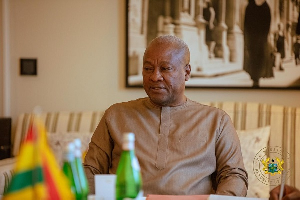The Ministry of Roads and Transport has asked Cabinet to develop a more systematic increment regime in fuel levy to strengthen the capacity of the road fund to sustain road maintenance in the country.
The ministry also requested for an increase in fuel levy by an equivalent of two US cents in 2003 and that this should be reviewed upwards by one cent annually from January 2004 until the target of 9.5 cents was achieved.
Dr Anane said these at the opening of this year's annual donors Conference at the Georgia Hotel in Kumasi on Wednesday. The two-day conference was being attended by diplomats, Ghana's development partners, Members of Parliament under the theme, "Accelerating economic growth through road infrastructure development and maintenance".
Dr Anane said the total financial outlay required for this year's maintenance programme under the Road Sector Development Programme was ?1,342bn. The expected contribution from the road fund was ?465bn that represented about 34 per cent of the funds needed for maintenance.
The Minister said the contribution was based on the expected increase of the fuel levy from ?230 per litre to ?305 and said the government could not effect the increment due to the simultaneous hikes of tariffs for the utilities.
Dr Anane told the conference that preparation and procurement procedures at the ministry, its agencies and at the level of the Central Tender Board have all been sanitised and been fast tracked.
He said from next year, his ministry would carry out financial, technical and procurement audit on all activities undertaken under the RSDP and to report to their development partners. This, he said, would re-assure them of the country's commitment to ensuring transparency procuring goods and services and the award of contracts.
Dr Anane said there was a correlation between the incidence of poverty and poor road network. He cited that the Upper East Region with 88.2 per cent of the population living below the poverty line had 65 per cent of its road network in poor condition.
He said the focus of the road sub-sector was therefore to increase investment in road infrastructure in the region, where poverty levels were high to enhance movement of goods and services from production centres to marketing centres.
Marts Karlson, the World Bank Country Director, told the donors to ensure that they fulfilled their promises and pledges made towards the country's development agenda. He said the pledges they should be translated in concrete terms to bring improvement to the road sector thereby reducing poverty.
Karlson praised the government for good governance and good policies that had led to macro-economic stability and its strong commitment to promoting private sector-led growth. He called for a comprehensive approach to road infrastructure development and said this was necessary in view of the fact that between 60 and 70 per cent of the country's food supply was by road transport.
The World Bank Country Director said the expansion; improvement and development of the road network should be balanced with the capacity to maintain them.
Sampson Kwaku Boafo, Ashanti Regional Minister, hoped the conference would provide the platform for candid and dispassionate discussion of the performance of the road sector to facilitate the development.
General News of Thursday, 28 November 2002
Source: gna
















